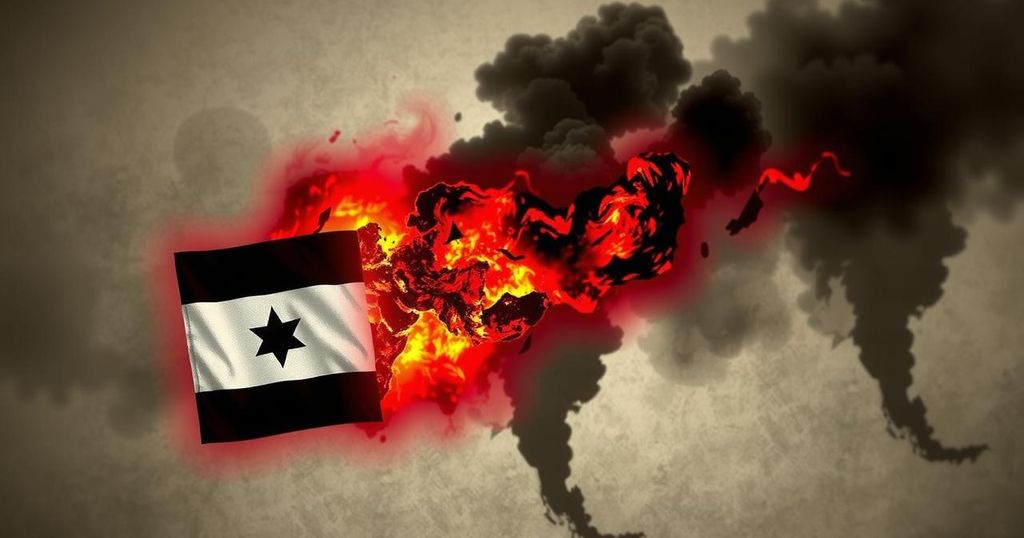The resurgence of the Syrian civil war presents Israel with a dilemma regarding the potential rise of either Iranian-backed Shia extremists or Turkish-backed Sunni jihadists at its borders. Israel’s strategy focuses on maintaining a balance where Assad is weakened but not overthrown, preventing chaos that could threaten its security. The dynamics in Syria are influenced by the broader conflict involving Hamas, Hezbollah, and the role of major powers like Iran, Turkey, and Russia.
The recent escalation of the Syrian civil war raises complex considerations for Israel, prompting many to ponder whether it would prefer Iranian-backed Shia extremists or Turkish-aligned Sunni jihadists to establish themselves along its northern border. Israel’s strategy is to monitor developments in Syria, intervening only if its security is threatened, echoing the sentiment once expressed by Yitzhak Shamir during the Iran-Iraq War: to hope both adversaries succeed in weakening one another.
On November 27, an alliance of Sunni jihadists, including former al-Qaeda affiliates, launched a major offensive in Aleppo with Turkey’s endorsement, marking a significant shift in the conflict dynamics. The resurgence of violence is viewed as a ripple effect from Hamas’s October 7 attack on Israel, which opened a front for Hezbollah and led to extensive military operations aimed at diminishing its capabilities.
With Russia, Iran, and Hezbollah all weakened or preoccupied, the opportunity for the rebels to reassert their influence became apparent. They initiated their assault coincidentally with a ceasefire announcement between Hezbollah and Israel, highlighting the shifting balance of power in the region.
For Israel, the weakening of Assad’s regime may serve its interests by diminishing Iran’s foothold in Syria. However, there exists a paradox; Israel desires Assad to remain in power, albeit diminished, to avoid chaos and unpredictability that could arise from a power vacuum. This delicate balance allows Israel to manage its adversarial relationships while leveraging Syrian instability without direct involvement in hostilities.
In contrast, Turkey’s involvement stems from its objective of resettling Syrian refugees in the country and countering Kurdish movements. Erdogan’s support of the terrorists enhances his bargaining position against Assad.
Meanwhile, Iran stands to lose significantly from the rebels’ advances, as it has heavily invested in preserving Assad’s regime. A weakened Syria threatens Iran’s strategic interests in establishing a conduit for weaponry to Hezbollah. Lastly, Russia seeks to maintain its geopolitical influence through Syria, having established strategic military footholds; hence, it actively strives to curtail the rebel advance despite being engaged in Ukraine. As this conflict unfolds, the implications for regional stability remain profound and unpredictable, heavily influencing international relations in the Middle East.
The Syrian civil war, which commenced in 2011, has been a prolonged and complex conflict that includes numerous factions with varying agendas. Israel’s security concerns are closely linked to developments in Syria, particularly regarding Iranian influence and the presence of militias that threaten its borders. The war has not only been a humanitarian crisis but also a battle for regional power dynamics, significantly impacting relationships among major players like Iran, Turkey, Russia, and Israel. The recent escalation of hostilities is influenced by broader geopolitical events, such as Hamas’s attack on Israel, creating additional layers of complexity for Israel and its strategic options in the region.
In summary, the unfolding events in Syria have significant ramifications for Israel and the broader Middle East landscape. While a weakened Assad regime aligns with Israel’s interests by potentially curtailing Iranian influence, the desire for stability and predictability renders a complete overthrow of Assad unfavorable. Permuting the nuances of regional politics, Turkey’s motivations, and Iran’s losses in this turbulent context further complicate the situation. As these rivalries persist, Israel remains poised to safeguard its interests while navigating the fragile balance of power.
Original Source: www.jpost.com






